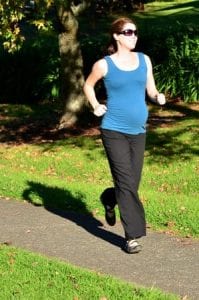 For some women, the notion of exercising while pregnant holds about as much appeal as the prospect of having a tooth extracted without novocaine. These women view their pregnancy as a time to skip working out, and not always because that’s what they want to do.
For some women, the notion of exercising while pregnant holds about as much appeal as the prospect of having a tooth extracted without novocaine. These women view their pregnancy as a time to skip working out, and not always because that’s what they want to do.
Often, during the first trimester of pregnancy, women battle morning sickness and extreme fatigue. The next three months of pregnancy they are beginning to show, and they might be worried that exercising will somehow harm their unborn child.
During the final three months of pregnancy, exercising can be very uncomfortable. For some women even walking is challenging, let alone doing anything more strenuous.
Then there are the women who refuse to let pregnancy stop them from sticking to their workout schedule. We’ve all seen them, speed walking around the neighborhood rain, hail or shine, determinedly putting some of their non-pregnant sisters to shame.
The majority of us fall somewhere in between these two examples, which is what most obstetricians like and recommend. They say that exercising while pregnant helps prevent excessive weight gain and that women who continue exercising during pregnancy regain their pre-pregnancy figure faster than those who don’t.
Maintaining a regular fitness regimen throughout your pregnancy can also improve your posture, which in turn decreases the likelihood of back pain occurring. There is also evidence that along with relieving stress, being physically active during pregnancy can help to prevent gestational diabetes, increase energy levels and build stamina that will assist with labor and childbirth.
Still, if you plan to exercise during pregnancy, there are some things to keep in mind that will help protect you and your growing baby, especially if you haven’t exercised before.
In this article on exercising while pregnant, we will cover exercises that are safe and those to avoid during pregnancy.
Table of Contents
How Much Exercise Should a Pregnant Woman Do?
Before starting, the first and one of the most important things to do is check with your doctor that it’s okay for you to exercise. For most of us, it will be, but each of us is different. Discuss your proposed exercise plan and any precautions that may pertain to your individual situation.
If you get the go ahead and you were physically active before falling pregnant, it should be safe for you to continue with your regular exercise program. In fact, the American Congress of Obstetricians and Gynecologists (ACOG) recommends pregnant women do 30 minutes or more of moderate exercise per day on most if not all days of the week unless they have a medical condition or pregnancy complication that makes exercising inadvisable.
This is just a guideline. If you can only manage to exercise three times a week for 20 minutes, you will still benefit from doing so.
Doing Exercise During Pregnancy Tips & Demo
Who Should Not Exercise During Pregnancy?
Women with medical conditions including heart disease, asthma, and diabetes, may not be able to exercise when pregnant. Working out may also be harmful to women with certain pregnancy-related conditions. These include bleeding or spotting, low placenta, previous premature births or a history of early labor, threatened or previous recurrent miscarriages and a weak cervix.
If you suffer any of these conditions and your healthcare professional gives you the okay to exercise, follow his or her guidelines and don’t overdo it.
What Exercises are Safe to do During Pregnancy?
Most exercise is safe to undertake during pregnancy, as long as you use common sense. It’s not  wise to try out strenuous new exercise routines when you are pregnant. Stick with what you’ve already been doing, but don’t feel you have to keep exercising at the level you did before becoming pregnant.
wise to try out strenuous new exercise routines when you are pregnant. Stick with what you’ve already been doing, but don’t feel you have to keep exercising at the level you did before becoming pregnant.
If you usually run for exercise, you may need to ease back to a jog during your second trimester. During your third trimester, you may need to slow down further and walk.
Two of the best and easiest forms of exercise for pregnant women are walking and swimming. Yoga is great too, but not hot yoga. Indoor stationary cycling, step, and elliptical machine workouts are also good choices that deliver numerous benefits.
If you don’t have any exercise equipment and you don’t want to buy any or join a gym, there are plenty of pregnancy workout DVDs o choose from. This form of exercise is effective, and it carries very little risk of injury. It will benefit your entire body, and it can be continued up until your baby’s birth.
Tennis and racquetball are other safe options. However, be aware that changes in balance during pregnancy from around the fourth month onwards, can affect rapid movement. For this reason, exercise that doesn’t require a high degree of balance or coordination is preferable.
 If you’ve been doing low-impact exercise, now is not the time to switch to high-impact. If you’ve been doing high-impact exercise, you may need to change to something lower impact. Do what feels comfortable and what you can manage now, adapting as your pregnancy progresses.
If you’ve been doing low-impact exercise, now is not the time to switch to high-impact. If you’ve been doing high-impact exercise, you may need to change to something lower impact. Do what feels comfortable and what you can manage now, adapting as your pregnancy progresses.
Go easy on yourself if some days you don’t feel up to it and have to skip your workout. In all likelihood, you will have to do a little less with each trimester. This is normal. Don’t push yourself to do what you did during the previous trimester or even the previous month.
What if I’ve Never Exercised Before?
If you haven’t exercised before and would like to start, there’s no reason you can’t, providing you don’t overdo it. Swimming and walking are good, safe options.
If you decide to walk for exercise, start with 10 to 15 minutes done at a gentle pace. Gradually increase your pace, building up to 20 or 30 minutes. Try to walk a minimum of 3 to 4 times a week. If you are unable to carry on a conversation while walking, you are going too hard. Aim for a pace where talking is a bit of a challenge, but doable.
Is it Okay to do Ab Toning Exercises When Pregnant?
You may be surprised to learn that ab toning exercises can be beneficial for pregnant women.
According to fitness experts who specialize in training moms-to-be, doing toning exercises  throughout your pregnancy to strengthen your abs, core, and pelvic floor muscles will often result in an easier labor and delivery and a shorter recovery time following the birth.
throughout your pregnancy to strengthen your abs, core, and pelvic floor muscles will often result in an easier labor and delivery and a shorter recovery time following the birth.
If floor exercises such as Crunches, Sit-ups, and Push-ups are a regular part of your workout, it’s okay to continue doing these until about fourteen weeks into your pregnancy. Once you pass your first trimester, it’s best to avoid exercises that are done lying on your back. At this point, swap to gentle standing pelvic tilts and seated belly breathing. You can also tighten your ab muscles, holding the contraction, before releasing it.
Are there any Exercises to Avoid During Pregnancy?
When pregnant, a woman produces relaxin, a hormone that helps to lubricate the joints, making labor easier. When our joints are relaxed, our range of movement is greater. This being the case, the risk of injuries, such as muscle pulls, increases. For this reason, care must be taken when stretching and reaching during exercise.
For example, previously you may not have been able to touch your toes, whereas now you can reach beyond them. This doesn’t mean that you should. To be safe, it’s wise to stay within your pre-pregnancy range of motion. You should also be very careful when doing exercises that involve deep muscle or joint movements, such as heavy lunges, squats and the like.
Other exercises to avoid during pregnancy include those that require good balance, such as biking and skiing and contact sports like soccer.
Signs You Should Stop Exercising and See Your Doctor
If, while exercising, you experience pain, spotting, bleeding or fluid leakage, make an appointment to see your doctor immediately. Likewise, if you notice a decrease in fetal movement or you experience uterine contractions. Other reasons to see your doctor right away include muscle weakness, swollen or painful calves, severe headache, chest pain, shortness of breath that gets worse, dizziness or feeling faint. He or she will tell you whether or not it is safe for you to continue working out.
Exercising While Pregnant Summary
Not that long ago, pregnant women were advised to cut back on, or even avoid exercising. These days, we know better. Not only is exercising while pregnant okay, usually it will be very beneficial for both the mom and the baby. Just be sure to listen to your body and use common sense.
NB Pregnant women should always check with their physician before commencing a fitness program.
Click here to read an article on How to Lose Baby Belly Fat Quickly, Safely, and Easily

